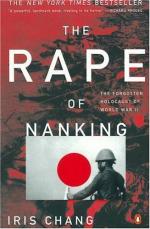
|
| Name: _________________________ | Period: ___________________ |
This test consists of 5 multiple choice questions, 5 short answer questions, and 10 short essay questions.
Multiple Choice Questions
1. All BUT WHICH of the following groups of citizens remain in Nanking after the soldiers leave the city?
(a) Children.
(b) Government leaders.
(c) Elderly.
(d) Poor.
2. In the Foreword, what is the date given for the fall of Nanking?
(a) October 4.
(b) December 13.
(c) December 25.
(d) November 8.
3. Toward the end of "The Nanking Safety Zone," Chang states that the Safety Zone holds about how many refugees?
(a) Three to four hundred.
(b) Six to eight hundred.
(c) Nine to twelve hundred.
(d) Two to three hundred thousand.
4. "The Path to Nanking" states that Japan's golden era of prosperity comes to an end during which decade?
(a) 1940s.
(b) 1890s.
(c) 1920s.
(d) 1930s.
5. In what year does Japan withdraw from the League of Nations?
(a) 1934.
(b) 1933.
(c) 1930.
(d) 1936.
Short Answer Questions
1. In "The Path to Nanking," the author states that the Japanese Samurai code of conduct is called what?
2. According to the Introduction, Americans think that World War II began in which year?
3. According to Ms. Chang, why is the Rape of Nanking not as well known as the Holocaust or Hiroshima?
4. What mood does the commander of Nanking find when he arrives at the river dock?
5. During which year does the author say she first realized the Nanking massacre was historically accurate and not simply myth?
Short Essay Questions
1. What are the responses of Japan and China when Nanking falls, as described by William Kirby in the Foreword?
2. What does the author accomplish by referring to Nanking as a "forgotten Holocaust," according to Kirby?
3. Describe the process by which new Japanese soldiers were desensitized.
4. In "Six Weeks of Horror," why do the Chinese civilians in Nanking initially believe that the Japanese occupation may not be so bad?
5. Describe how Tang Shunsan was able to survive his encounter with Japanese soldiers.
6. Describe the broad time line and details of the Rape of Nanking as outlined in the Introduction.
7. What was the relationship between Chiang Kai-shek and Tang Sheng-chih at the time of the Nanking invasion?
8. What was Japan's isolationist foreign policy intended to accomplish, and in what ways did that policy backfire?
9. As discussed in "Six Weeks of Horror," why will the world never fully understand the psychic toll taken on the women of Nanking, despite best efforts to accurately count the number of rapes?
10. In what way can we now think of Nanking as a different sort of turning point, according to Kirby?
|
This section contains 1,024 words (approx. 4 pages at 300 words per page) |

|




